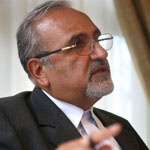Turkey’s Smile at ECO; Another Chance for the Organization

While the Economic Cooperation Organization (ECO) summit ended on Thursday 23rd of December in Istanbul, for many there is still the lingering question about the lack of dynamism in this organization as compared to many of its regional counterparts. Ali-Akbar Farazi, former deputy president of ECO, elaborates on the achievements of the summit:
For me, as a diplomat in contact with the ECO for years, the recent developments in the ECO summit –held in Istanbul- should be viewed from a new angle: it was not another formal, hardly fruitful meeting between leaders of some Asian countries; rather, it was another element in Turkey’s efforts to redefine its regional role.
For long, Turkey had inflicted inertia upon ECO’s plans. Every single plan was obstructed in approval or implementation by Turkey, which witnessed itself engaged in a (covert) political rivalry with Iran. Ankara’s suspicion merely decelerated ECO’s ambitions.
With the dissolution of the Soviet Union and the membership of former Soviet republics, the Tehran-Ankara struggle reached its zenith, in a fashion that even disillusioned the new members and forced some to seek advancement of their interests in other regional alliances. However, new economic and diplomatic developments in the global order, the West’s economic crisis, new arrangements in the Middle East (particularly Iraq), and most important of all the rise of a progressive government in Turkey that follows a policy of normalizing ties with its neighbors has paved the way for a new era in ECO’s activities.
While still seeking EU membership, Turkey is seriously following a policy of approaching its Middle Eastern neighbors and an effective participation in regional treaties. Turkey’s interim leadership of the Economic Cooperation Organization will most likely bring positive outcomes. Among the member states, Turkey is the country that has most efficiently revived its private sector, which is now a powerful force in economic activities. Turkey’s private sector, if activated in the region and combined with the political determination of Turkish politicians, can be a driving force for ECO plans awaiting years to become operational. ECO can also take advantage of Turkey’s stature in fiscal organizations to attract foreign investors to implement ECO’s projects and upgrade the organization’s regional position.
Energy transportation routes, inter-ECO railway and other missing links will serve the interests of all member states while enhancing Ankara’s position at the regional and global level, helping the country boost its ties with the industrial world. Turks know well that the path to Europe passes through the Middle East, so playing a more serious role in ECO and convincing other regional states to join the organization will also add to Turkey’s international prestige.

